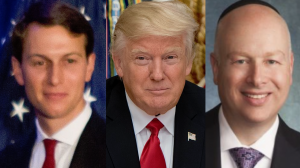
Jason Greenblatt, who arrived in Israel on Monday is scheduled to hold meetings in Jerusalem & Ramallah until the arrival on Wednesday of Trump’s son-in-law adviser and all-around trouble-shooter, Jared Kushner, “in trying to achieve the ultimate deal,” said former US ambassador Dan Shapiro, in a conference call on Monday.
By HERB KEINON
US President Donald Trump, in the thick of all kinds of investigations at home, has managed to create leverage in the Middle East. But it is the type of leverage that needs to be used quickly before it dissolves.
That at least is how former US ambassador Dan Shapiro looks at the Trump administration’s continuing diplomatic push in the region – one that will be reinforced Wednesday with the arrival of Trump’s son-in-law, adviser and all-around trouble-shooter, Jared Kushner.

Netanyahu, Abbas and Greenblatt (center) in the first Israeli-Palestinian shuttle diplomacy of the Trump administration.
Kushner and his wife, Ivanka, joined Trump on his visit here last month, but this will be his first stab at the type of Israeli-Palestinian shuttle diplomacy that up until now under this administration has been carried out by Jason Greenblatt, who himself arrived on Monday.
While Greenblatt is scheduled to hold meetings in Jerusalem and Ramallah until Thursday, Kushner will be here only one day.
Shapiro, in a conference call on Monday organized by the Israel Project, said these visits are further signs of Trump’s seriousness “in trying to achieve the ultimate deal.”
According to Shapiro, Trump laid a good foundation for these efforts with positive interactions he has had with Prime Minister Benjamin Netanyahu, Palestinian Authority President Mahmoud Abbas and the leaders of the Sunni states he has met since his inauguration in January.
Trump, said Shapiro, has made clear that he has expectations of all sides. These expectations include: Israel restraining settlement construction; the Palestinians halting payments to the families of terrorists and the terrorists themselves; and the Arab countries showing an openness to gestures of normalization toward Israel, such as economic ties and civil aviation links.
“It seems to me that these preliminary conversations led to the point where the time is coming for him and his administration to put forth their own ideas, perhaps a proposal of principles to guide negotiations on final status, and the steps each side can take to support that effort,” Shapiro said.
The former envoy advised the administration to move quickly, saying Trump is presently at his point of maximum leverage in the region and that none of the parties – after those initial positive meetings – wants those initial positive meetings – wants to say “no” to the US president.
Trump had a successful visit in the Middle East, both in Saudi Arabia and Israel and the Palestinian Authority, and gained the trust of the leaders, Shapiro maintained. “He has established friendly relations and each side wants to do more to deepen the positive relations with him.”
Shapiro said Trump also made clear that “he has ‘asks’ of those leaders as well, and because of his known unpredictability, including his Twitter feed, he is very difficult to say no to.” Concern about how he would respond on Twitter, if spurned, gives him additional leverage, Shapiro said.
It is into this breach that Kushner is now stepping.
Kushner’s arrival and involvement in the process “raises the stakes for everyone,” Shapiro said, with the president’s son-in-law essentially daring each of the parties to say no.
“My guess is that they won’t,” he maintained. “Under the Kushner- Greenblatt leadership on behalf of the president, they put forward a set of proposed steps by each side to launch negotiations and support them with steps on the ground. My supposition is that no party will want to say ‘no.’ They may say, ‘yes, but,’ or ‘yes, with reservations.’ But I think they have a real opportunity if they move quickly to capitalize on the leverage the president has attained.”
But leverage has a tendency to dissipate over time, Shapiro said, as small disagreements with each party can gradually lower the cost of each subsequent disagreement, with the sides then finding it easier to say no.
Trump’s domestic problems may also erode the leverage, another reason the administration may feel the impetus to act on this issue quickly.
“I think it is certainly possible for presidents to continue to conduct foreign affairs while dealing with domestic political troubles, and we have seen examples of that over many administrations in the past,” said Shapiro.
“But it is true that if the investigation drags on for a long, long period of time, and there begin to be questions raised about the future of the administration, that will contribute to a lessening of his leverage.”
View original The Jerusalem Post publication at:
http://www.jpost.com/Israel-News/Trump-ups-the-ante-in-diplomatic-process-by-dispatching-Kushner-to-region-497342






 Israeli New Shekel Exchange Rate
Israeli New Shekel Exchange Rate